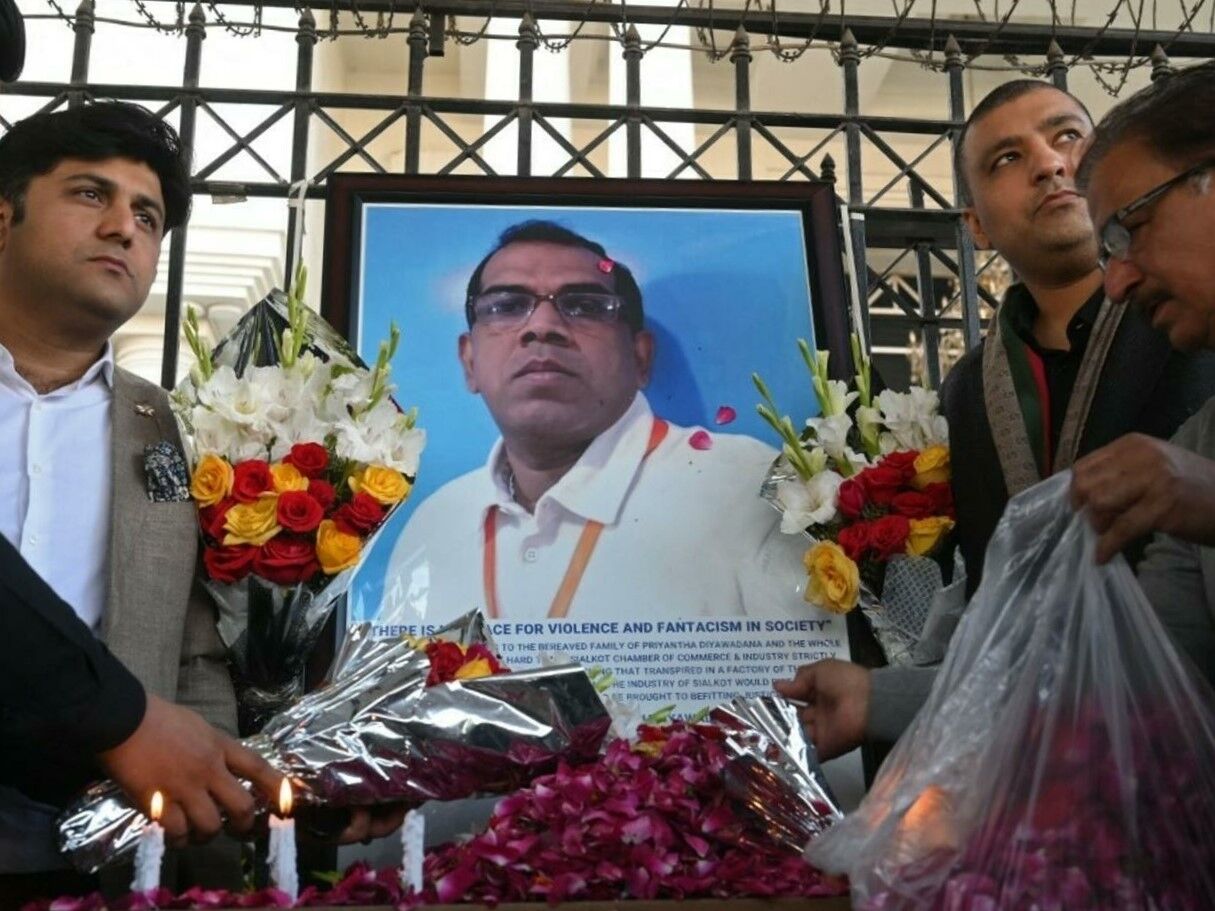Blotted with bloodstains
The grotesque killing of a Sri Lankan national in Pakistan under the garb of blasphemy maligns the aspirations of ‘Naya Pakistan’

In a shameful and grotesque case of mob lynching, preceded by barbaric torture, a Sri Lankan, Priyantha Kumara, was burnt alive on December 3 in Sialkot, in Punjab Pakistan. The frenzied mob suspected the victim of committing blasphemy. This condemnable incident has evoked vehement criticism from several quarters. Sri Lanka, reacting very angrily, has called upon Prime Minister Imran Khan to arrest those responsible for this grotesque act, by intensifying investigations so that the guilty is rewarded severest punishment.
Imran Khan was one of the first persons to condemn the offenders, terming the day of the incident as a "day of shame" for Pakistan. In a similar vein, Chief of the Army Staff (COAS) Gen Qamar Ahmad Bajwa described it as an act of cold-blooded murder. In fact, the entire top leadership of Punjab, including the administration and the police, entered into a criticism mode, unequivocally avowing to bring the guilty to justice. Such a spate of criticism around the darkest incident in Sialkot — based on religious extremism and intolerance — shows that Pakistan's image globally has taken a beating. This will also hit its sinking credibility amongst the world amid its shrinking reputation for terror, infamous blasphemous laws, intolerance etc.
However, while dwelling on the subject, it may be recalled that Pakistan is afflicted with archaic blasphemous laws which allow death penalty. There have been very rare cases when some liberals or human rights' activists or lawyers had tried in vain to bring in amendments to these draconian laws. To illustrate, it seems imperative to dwell on the murder of Salmaan Taseer, then Governor of Punjab, who was gunned down by his own bodyguard, Mumtaz Qadri in January 2011. Taseer was also targeted as he was defending a minority woman Asiya Bibi, accused of blasphemy. Later, Asiya had to be rehabilitated in Canada as the zealots in Pakistan were baying for her blood. One can judge the extent of religious radicalization prevailing in the youth without even sparing a trained and "disciplined" member of the police force who killed his own protectee. Such a sorry state of affairs exists where the government is hapless with no teeth or fangs or even the political will to effectively deal with the existing laws on blasphemy. Pakistan as a failing state has always been subject to religious indoctrination. Gen Zia ul Haq, the military despot of Pakistan from 1977 to 1988, had systematically eroded the society by subverting their minds by mixing religion into politics. Such a malaise is difficult to be remedied let alone reversed. These flawed judgments have now manifested into the murder of the Sri Lankan factory manager who became a victim of intolerance. This is also a wake-up call for Prime Minister Imran Khan who had promised a 'Naya Pakistan' but his dreams and ambitions stand shattered due to the writ of the fanatics who are keeping the government hostage by mounting pressure and emotional blackmail. Very recently, The Tehreek e Labbaik Pakistan (TLP) had compelled the military-backed government of Pakistan to submit to its demands securing the release of their leader from incarceration. Such a weak-kneed position by an elected government must have emboldened the religious forces which encouraged the Sialkot mob to target a foreigner battering and torching him to death. Unless drastic deterrent measures are not taken now, there will be recurrences in the name of blasphemy. And, that would mean very soon Pakistan and Afghan Taliban will be akin in their activities thriving on shared religious intolerance and violent extremism. In this backdrop, in another undiplomatic and careless remark, Defence Minister Pervez Khattak has suggested that the ghastly lynching of a Sri Lankan man at the hands of a mob in Sialkot should not be linked to the government's decision to lift the ban on the Tehreek-i-Labbaik Pakistan (TLP), saying even "murders take place" when young people get emotional. This statement was most insensitive and shows the scant respect for the deceased who was killed so brutally. On the other hand, Rohan Gunaratna, Director General of the Sri Lankan military think tank, the Institute of National Security Studies, who accompanied President Gotabaya Rajapaksa to the Indian Ocean Conference in Abu Dhabi, said that the lynching and burning of the Sri Lankan is a clear reflection of the spread of Salafi Wahhabism in the region. And it's a cancerous ideology that has to be contained, isolated and eliminated.
Meanwhile, the Sri Lankan Parliament has also unanimously condemned the incident and the Muslim Civil Society in Colombo too has criticized the cold-blooded murder of Sialkot. Pakistan Foreign Minister, Shah Mahmood Qureshi, has assured his Sri Lankan counterpart, G.L. Peris, that Pakistan will leave no stone unturned to hold the perpetrators to account. It may be recalled that in the past, Sri Lankan cricketers' bus was attacked in Pakistan by terrorists. This notwithstanding, Pakistan and Sri Lanka seem to have "excellent" diplomatic relations and it would seem despite the ghastly murder, both are cautious in their dealings lest their delicate relationship takes a hit.
The writer is a retired IPS officer, a security analyst and a former National Security Advisor to the PM of Mauritius. Views expressed are personal



